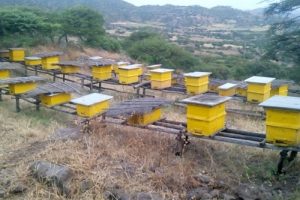
BY ABEBE WOLDEGIORGIS
Though currently the nation’s economy faces challenges, enterprises have still better chance to boost the economy. As Ethiopia has abundant natural resources with bulky man power, tapping the resource and creating job opportunity is a viable option to them, Asfaw Abebe, Director of the Ethiopian Enterprises Development said.
He further said that the sector has the capacity to substitute imports and boost export which in turn enhances the nation’s foreign currency earning capacity. Similar to supporting the government’s effort for the economic endeavor, paying attention to the sector is vital to reviving the economy and to that end expanding the establishment of small and medium sized enterprises which utilize locally obtained raw materials is essential.
As to Asfaw, as the inhabitant of 100 million plus population, Ethiopia consumes both foreign and local products on the daily bases. Therefore, expanding manufacturing industries in each woreda is vital to substitute the imported goods and to satisfy the domestic demand. Exporting raw materials with no value addition only to obtain hard currency is not viable. Therefore, increasing value added production commodities step by step is essential for transforming the economy and achieving structural change. Export also must consider the quality of products to be competent in the international market.
Side by side with these, bringing attitudinal change is vital by promoting, appreciating and consuming local products. Because it is a part of the import substitution scheme; whenever citizens purchase goods for themselves and for beloved ones should prefer local products than foreign products and such approach paves the way to embark on economic development strategy similar to India and China.
Among the subsectors’ products such as leather, textile garment and shoes are prioritized. There are various reasons to prefer the sector. Ethiopia is known to its large number of livestock in Africa and the type of skin found in the high land parts of the country has high demand in foreign markets. Cotton products used as raw material for garment and textile are also locally obtained and currently large cotton farms are expanding. The industries are labor intensive and can create job opportunities to thousands. It also plays crucial role in stimulating creativity, attracts local and foreign investment, substitutes imports and meet local demand, creates link between agriculture and manufacturing. As they have high demand in foreign markets, they can boost export.
Developing the consumption habit to the local products is as equally essential as producing the commodities. As to Asfaw, Ethiopians should change their attitude in consuming imported food products because the country has large uncultivable land that can produce huge amount of food both qualitatively and quantitatively. It also has abundant unutilized both surface and underground water resource. Moreover, excessive and non harvested water in the rainy season is available. Hence, through developing irrigation farm based on the agro-ecology, producing various types of crops is possible.
Importing wheat for a country that is agriculture has become the major contributor of the economy such as Ethiopia is embarrassing. The ongoing winter season cultivation of wheat with irrigation farm should be replicated on other crops such as cotton. Currently, the practice is continued both in the law and high land parts of the country. The recent years’ experience indicated that if the production gets its momentum, it is possible to be food self -sufficient. Substituting the importation of wheat attracts investors to engage in establishing food processing enterprises which necessitates the expansion of factories such as pasta, macaroni and bread which in turn creates job opportunities for thousands.
It is understood that currently food factories utilize wheat as an input but due to the insufficient supply in the local market, they import some portion of their input from abroad. Hence rising wheat production and productivity can reduce dependency on import. As to Asfaw, in some regions the cultivation of fruit and vegetable is expanding and supplying products to the market increased and this proved that within few years it is possible to substitute the imported food products. Currently, though the nation’s main stay of the economy is agriculture that includes fruits production, its importation of juices from abroad is surprising.
In the regions such as Gambella and Benshangul-Gumuz, Mango which is an input to make juice is found abundantly and wildly produced but due to the absence of sufficient transportation system, most of the product is perished in the wilderness. Had there been juice processing plants in the nearby towns, the wasted products would have been changed in to consumable product and supplied to domestic markets and plays its part to substitute the imported one. In fact, in some parts of the country, mango squeezing manufacturing is flourishing but it is still in its infant stage. Hence, supporting investors to put more money in the sector is vital.
As to Asfaw, his organization planned and studied how many industries to be established; how the venture gets legal support; how could it be financed; where the production place is available and from where raw material is supplied. The study is conducted with the cooperation of various stakeholders and significant number of investors showed interest to participate in the venture. Asked the role of the private sector in expanding enterprises, Asfaw said that so far many are engaged in trade particularly in import and export and to him, they preferred trade because they assumed that the venture’s risk is zero but such rational is not convincing.
Rather it makes the nation’s economy import dependent and hampers the expansion of productive enterprises. He further said that, engaging in productive enterprises via utilizing raw materials as inputs available in the local market, creates job opportunities for thousands, enhances self -sustaining economy and creates middle staff role play opportunity between farming and agribusiness.
Most businessmen in the last three decades have developed a mentality of get quick – rich and to advance such interest they engage in import business. Most businessmen who had political affinity with the ruling party intentionally engaged in such activities because they obtained money in a short cut way which is ill-gained wealth through corruption. The recently Ethiopian Economic Association published study paper indicated that Ethiopia missed opportunity to be self -sufficient in cocking oil in the last two decades because the businessmen engaged in importing edible oil who had party affinity and discouraged the businessmen not to engage in edible oil production intentionally to leave the country thereby made the country import dependent .
Financial institutions also collaborated with the corrupted businessmen by not providing loan to investors showed interest to engage in edible oil production and sustained the import. Similarly, saboteurs engaged in exporting oil seeds instead of using it as input in local industries. Such practice critically hampers the nation’s opportunities to propel its economy for advancement through the expansion of productive enterprises.
The secret behind the economic advancement of countries such as India and Vietnam is relying on their own locally produced commodities. In the past, these countries used to import basic needs such as food, closing, shoes and others. They developed a sense of proud in utilizing their local products and minimized their importation of foreign products. After three decades they became the leading exporters of garment and textile and shoes to the world market. It is impossible to be competent in the foreign market without adding value on exporting commodities.
Currently, productive enterprises have limitations in this regard and supporting them by providing incentive, access to loan and creating market linkage is essential. The importation of products that can be produced locally affects the competency of local manufacturers so that import substitution should be taken as a way out. As to Asfaw, Ethiopia exports products worth three billion Dollar and in contrary, imports products worth of 15 billion Dollar and this indicates how the nation is indulge in trade deficit. And this should alarm all citizens.
THE ETHIOPIAN HERALD SUNDAY EDITION 14 MAY 2023





